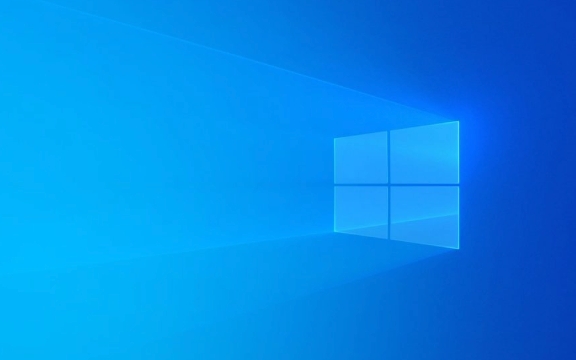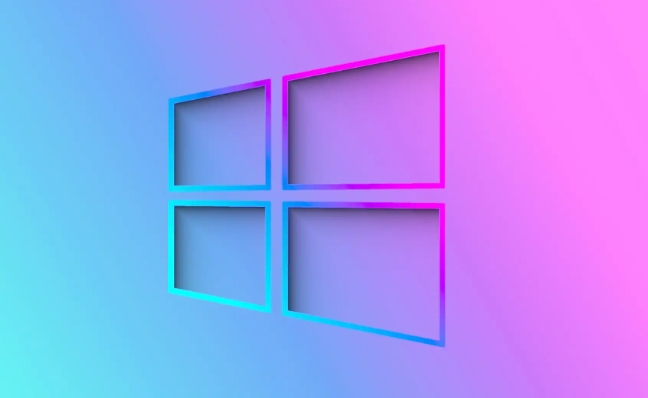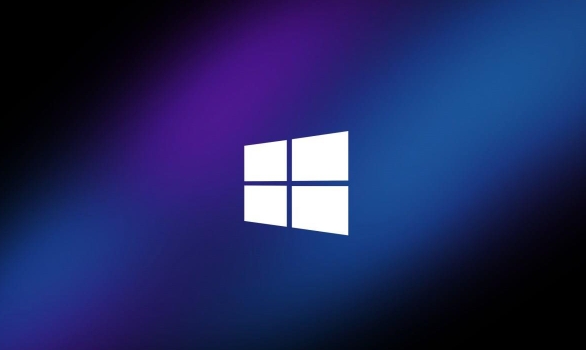 System Tutorial
System Tutorial
 Windows Series
Windows Series
 How to use the pathping command for advanced network tracing in Windows
How to use the pathping command for advanced network tracing in Windows
How to use the pathping command for advanced network tracing in Windows
Jul 31, 2025 am 08:23 AMpathping is used to identify network latency and packet loss along the route to a destination by combining ping and tracert features with detailed statistical analysis; 1. It works in two phases: first tracing the route, then sending ~100 packets over 250 seconds to each hop to measure latency, packet loss, and stability; 2. Basic usage involves running "pathping [destination]" in Command Prompt, waiting 4–5 minutes for results showing route trace and statistics per hop; 3. Advanced options include -n to disable hostname resolution, -h to set max hops, -p for ping interval, -q for number of queries per hop, and -w for reply timeout, allowing customization for speed or detail; 4. Troubleshooting involves checking for packet loss >5%, sudden latency increases, or consistent loss from a hop onward, with local issues indicated at early hops and external issues mid-path; 5. Use pathping instead of ping or tracert when diagnosing intermittent issues or pinpointing where packet loss occurs over time, though it is slower, taking several minutes to complete.

The pathping command in Windows is a powerful network diagnostic tool that combines the functionality of ping and tracert (traceroute), but with more detailed insights into network latency and packet loss. It’s especially useful for identifying where network issues occur along the route from your computer to a destination server.

Here’s how to use pathping effectively for advanced network tracing:
1. Understanding How pathping Works
Unlike tracert, which only shows the path and response time per hop, pathping sends multiple packets to each router (hop) over a period of time and calculates statistics based on the responses. This gives you a clearer picture of:

- Latency at each hop
- Packet loss between hops
- Network stability over time
It works in two phases:
- It traces the route to the destination (like
tracert). - It sends ~100 packets over 250 seconds (by default) to each hop to gather statistics.
2. Basic Usage of pathping
Open Command Prompt as Administrator (recommended) and type:

pathping www.example.com
Or use an IP address:
pathping 8.8.8.8
Wait for the command to complete — it takes about 4–5 minutes. You’ll see two sections in the output:
- Route trace: Lists each hop from your machine to the destination.
- Statistics: Shows packet loss percentage and latency (in ms) for each hop.
Example output:
0 YourPC 1 192.168.1.1 2 10.0.0.1 3 203.0.113.10 ... Computing statistics for 300 seconds... Source to Here This Node/Link Hop RTT Lost/Sent = Pct Lost/Sent = Pct Address 0 100/100 = 0% YourPC 1 1ms 0/100 = 0% 0/100 = 0% 192.168.1.1 2 10ms 5/100 = 5% 5/100 = 5% 10.0.0.1 3 45ms 20/100 = 20% 15/100 = 15% 203.0.113.10
In this example, the jump from hop 2 to 3 shows significant packet loss — indicating a potential bottleneck or unstable link.
3. Advanced Options and Flags
You can customize pathping behavior using command-line switches:
-n: Don’t resolve IP addresses to hostnames (faster, less clutter)pathping -n 8.8.8.8
-h MAX_HOPS: Set maximum number of hops (default is 30)pathping -h 20 google.com
-p: Wait time between pings (in milliseconds)pathping -p 500 target.com (waits 500ms between pings)
-q: Number of queries per hop (default is 100)pathping -q 25 google.com (sends 25 packets per hop)
-w: Timeout for each reply (in milliseconds)pathping -w 1000 server.local
Tip: Use
-q 10 -p 100for a faster but less accurate check (takes ~1–2 minutes).
4. Interpreting Results for Troubleshooting
Look for these red flags in the statistics:
- High packet loss (>5%) on a specific hop → Possible network congestion, faulty hardware, or routing issue.
- Sudden latency increase between two hops → Could indicate a slow link or overloaded router.
- Consistent loss from a certain hop onward → Problem likely at that node or beyond (e.g., ISP or remote network issue).
Note: The first few hops (your local network, router, modem) should show 0% loss and low latency. Issues here point to local problems.
If packet loss occurs at hop 1 (your router), check:
- Wi-Fi signal strength
- Ethernet cable
- Router performance
If loss appears mid-path, it’s likely outside your control — contact your ISP with the
pathpingresults as evidence.
5. When to Use pathping vs. Other Tools
Tool Best For pingQuick check of end-to-end connectivity and latency tracertFinding the route and detecting where traffic stops pathpingPinpointing where packet loss occurs over time Use
pathpingwhen:- You suspect intermittent network issues
-
pingshows high latency or loss -
tracerttimes out, but you want more data
Avoid
pathpingon time-sensitive diagnostics — it’s slow but thorough.
Basically,
pathpingis the go-to tool when you need deeper insight thantracertprovides. It’s not flashy, but it tells you exactly where your packets are being dropped or delayed — which is half the battle in network troubleshooting.The above is the detailed content of How to use the pathping command for advanced network tracing in Windows. For more information, please follow other related articles on the PHP Chinese website!

Hot AI Tools

Undress AI Tool
Undress images for free

Undresser.AI Undress
AI-powered app for creating realistic nude photos

AI Clothes Remover
Online AI tool for removing clothes from photos.

Clothoff.io
AI clothes remover

Video Face Swap
Swap faces in any video effortlessly with our completely free AI face swap tool!

Hot Article

Hot Tools

Notepad++7.3.1
Easy-to-use and free code editor

SublimeText3 Chinese version
Chinese version, very easy to use

Zend Studio 13.0.1
Powerful PHP integrated development environment

Dreamweaver CS6
Visual web development tools

SublimeText3 Mac version
God-level code editing software (SublimeText3)

Hot Topics
 How to run an app as an administrator in Windows?
Jul 01, 2025 am 01:05 AM
How to run an app as an administrator in Windows?
Jul 01, 2025 am 01:05 AM
To run programs as administrator, you can use Windows' own functions: 1. Right-click the menu to select "Run as administrator", which is suitable for temporary privilege hike scenarios; 2. Create a shortcut and check "Run as administrator" to achieve automatic privilege hike start; 3. Use the task scheduler to configure automated tasks, suitable for running programs that require permissions on a scheduled or background basis, pay attention to setting details such as path changes and permission checks.
 Windows 11 slow boot time fix
Jul 04, 2025 am 02:04 AM
Windows 11 slow boot time fix
Jul 04, 2025 am 02:04 AM
The problem of slow booting can be solved by the following methods: 1. Check and disable unnecessary booting programs; 2. Turn off the quick boot function; 3. Update the driver and check disk health; 4. Adjust the number of processor cores (only for advanced users). For Windows 11 systems, first, the default self-start software such as QQ and WeChat are disabled through the task manager to improve the startup speed; if you use dual systems or old hardware, you can enter the power option to turn off the quick boot function; second, use the device manager to update the driver and run the chkdsk command to fix disk errors, and it is recommended to replace the mechanical hard disk with SSD; for multi-core CPU users, the kernel parameters can be adjusted through bcdedit and msconfig to optimize the startup efficiency. Most cases can be corrected by basic investigation
 Why Overclocking Isn't Useful Anymore
Jul 01, 2025 am 03:03 AM
Why Overclocking Isn't Useful Anymore
Jul 01, 2025 am 03:03 AM
RelatedWhat Clock Speed Means and Why It’s Not the Only Factor in Choosing a CPUTick, tock, is that a clock?PostsFor years, people have tried to get better performance from CPUs (and other PC parts) by overclocking them—running the clock speed higher
 How to Change Font Color on Desktop Icons (Windows 11)
Jul 07, 2025 pm 12:07 PM
How to Change Font Color on Desktop Icons (Windows 11)
Jul 07, 2025 pm 12:07 PM
If you're having trouble reading your desktop icons' text or simply want to personalize your desktop look, you may be looking for a way to change the font color on desktop icons in Windows 11. Unfortunately, Windows 11 doesn't offer an easy built-in
 How to uninstall a Windows update that is causing problems?
Jul 01, 2025 am 12:48 AM
How to uninstall a Windows update that is causing problems?
Jul 01, 2025 am 12:48 AM
Uninstalling the problematic Windows update can solve the system instability problem. The specific steps are as follows: 1. Find the list of recently installed updates through "Settings" > "Update and Security" > "Windows Update" > "View Update History" and confirm the problem update; 2. Open the control panel, go to "Programs" > "Uninstall Programs" > "View Installed Updates", select the target update and uninstall, and restart it after the operation; 3. If you cannot enter the system, you can boot with the Windows installation USB drive, enter the "Command Prompt" to execute the wusa/uninstall/kb:XXXXXXX command to uninstall the update. Note that cumulative updates may affect multiple patches, and it is recommended to backup in advance
 Where can I find my Windows 11 product key?
Jul 01, 2025 am 12:53 AM
Where can I find my Windows 11 product key?
Jul 01, 2025 am 12:53 AM
If you need to obtain the Windows 11 product key, the answer depends on how you get the system. 1. If the system is pre-installed (OEM authorization), the key is usually embedded in the firmware and cannot be directly accessed and will be automatically activated during reinstallation; 2. You can use BelarcAdvisor, ProduKey and other tools to extract the key from the system, but you must ensure that the source is trustworthy; 3. If purchased or activated through a Microsoft account, you can log in to account.microsoft.com to view the associated key and digital license; it is necessary to note that the retail key can be transferred, while the OEM key is usually bound to the original hardware.
 Fixed Windows 11 Google Chrome not opening
Jul 08, 2025 pm 02:36 PM
Fixed Windows 11 Google Chrome not opening
Jul 08, 2025 pm 02:36 PM
Fixed Windows 11 Google Chrome not opening Google Chrome is the most popular browser right now, but even it sometimes requires help to open on Windows. Then follow the on-screen instructions to complete the process. After completing the above steps, launch Google Chrome again to see if it works properly now. 5. Delete Chrome User Profile If you are still having problems, it may be time to delete Chrome User Profile. This will delete all your personal information, so be sure to back up all relevant data. Typically, you delete the Chrome user profile through the browser itself. But given that you can't open it, here's another way: Turn on Windo
 How to fix second monitor not detected in Windows?
Jul 12, 2025 am 02:27 AM
How to fix second monitor not detected in Windows?
Jul 12, 2025 am 02:27 AM
When Windows cannot detect a second monitor, first check whether the physical connection is normal, including power supply, cable plug-in and interface compatibility, and try to replace the cable or adapter; secondly, update or reinstall the graphics card driver through the Device Manager, and roll back the driver version if necessary; then manually click "Detection" in the display settings to identify the monitor to confirm whether it is correctly identified by the system; finally check whether the monitor input source is switched to the corresponding interface, and confirm whether the graphics card output port connected to the cable is correct. Following the above steps to check in turn, most dual-screen recognition problems can usually be solved.





